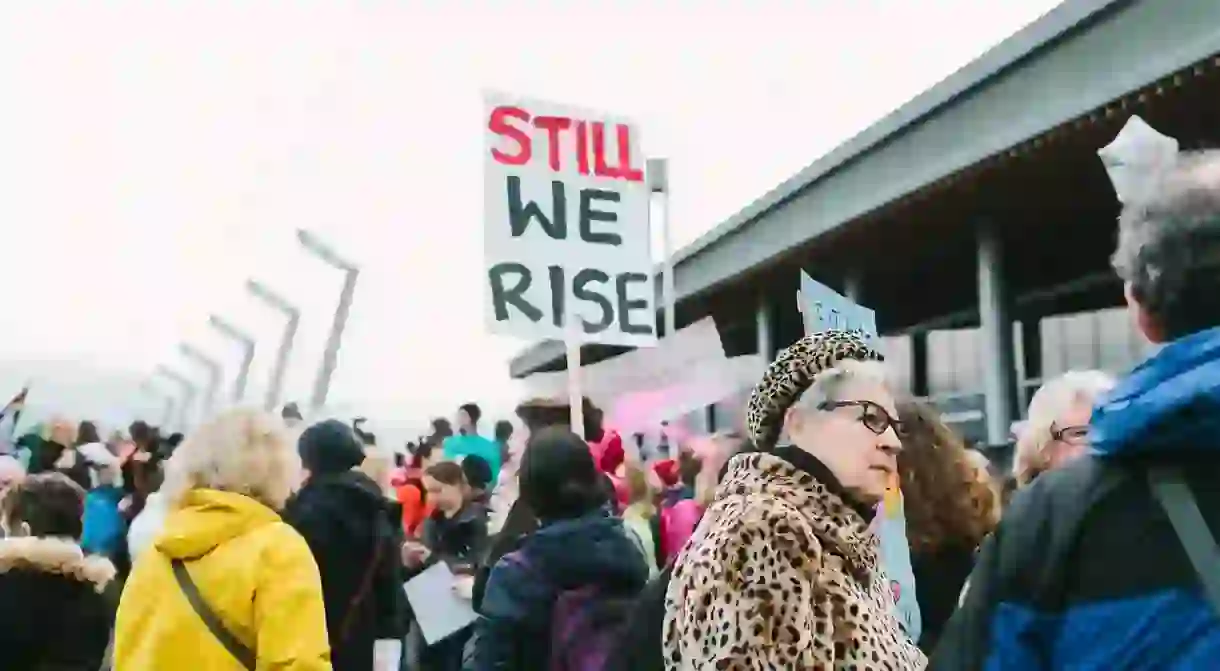Can Politics and Berlin's Nightlife Come Together to Create Change?

Earlier this year, Berlin clubbers brought their underground resistance to the streets in a protest against the far-right party, AfD (Alternative for Germany). Since the protest rave, many have marveled at and meditated on the unique intersection of partying and politics in Berlin, and how, beneath the surface of entertainment, nightlife is creating safe spaces and shaping political discourse in Berlin.
The Club Commission creates a conversation
Born out of reunification and housed in the leftover, empty buildings and warehouses of the city, the emergence of techno and a subversive club scene in Berlin helped bring young East and West Berliners back together. A cornerstone of the city’s identity, the distinctive scene has certainly evolved over the years. However, Berlin’s clubs have managed to preserve their eccentric, hedonistic vibe and continue to hold inclusive parties across the city. The German government recognises the mutually beneficial outcome of preserving club culture and has, in the past, stepped in to help save the city’s clubs.
Much of this can be attributed to the city’s independent Club Commission, an association of Berlin clubs that includes party and cultural event organisers, and which acts as the voice of the club scene, ensuring its recognition and that the political and economic needs of its members are fulfilled. As the spokesperson for the commission, Lutz Leichsenring, explains that ‘when it comes to creating awareness and access for decision makers, this is basically why the Club Commission was set up.’ The Commission works hard to create a dialogue between clubs and outside organisations, and Lutz says that because ‘the Club Commision has been running since 2001, so almost 18 years…one of [its] main purposes is to be in conversation with the stakeholders of the creative scene as well as politicians and other organisations. This is basically [the Commission’s] daily work.’

The Commission has never shied away from ‘creating awareness, organising demonstrations and so on, but it [has] always [reacted] to negative trends. Right now [it is] doing a lot of looking to the future and planning and not just being the firefighters,’ Lutz explains. The Club works hard to represent the multifaceted voices of Berlin’s rich and expansive music and club culture.
Lutz explains that the resulting intersection of clubs and politics can be attributed to the Club Commission’s efforts. ‘For instance, almost every political party in Berlin has somebody who acts as the music and club representative of the party, so political parties have a person who is an expert in clubs and music—this is pretty rare, not all cities have this.’ This representation is something that the Club Commission has worked towards by pushing the envelope and maintaining a dialogue with politicians. ‘We were forcing these political parties to be in conversation with us and at one point, they had to point someone out who is representing those topics,’ Lutz goes on to explain, adding that ‘if [the Club] had never asked questions or invited [the politicians] to be a part of the conversation…they wouldn’t have [appointed a person for the job].’ By creating a platform for Berlin’s clubs and encouraging political discourse, the Club Commission has bridged the gap between underground club culture and political discourse. However, as Lutz points out, the link between politics and clubs in Berlin runs deeper than this, as the ethos surrounding this relationship is rooted in a left-wing, inclusive ideology.
Club Culture is political
At the end of May of this year, tens of thousands of ravers took to the streets of Berlin after a collection of clubs mobilized against the AfD at Brandenburg Gate. Rainbow flags and techno music filled the air as party-protesters danced with beers and signs reading ‘Fck AfD’ in their hands; it was an iconic spectacle that firmly asserted Berlin’s left-leaning, anti-fascist identity. In a joint statement, the clubs present said that ‘the Berlin club culture is everything that Nazis are not. We are progressive, queer, feminist, anti-racist, inclusive, colourful and we have unicorns. On our dance floors, people from all backgrounds unite, with diverse desires, changing identities and good taste.’ To its core, this is the inclusive, safe and progressive ethos that Berlin’s clubs have always embodied, and as Lutz points out, ‘club culture is always political.’
The parties and dancefloors in Berlin reflect this ideology, and Lutz explains that the ‘people who are a part of a collective or consider themselves a part of a club, or regular participants in certain events, are part of a certain philosophy with the same ideals.’ In this sense the club culture in Berlin moves beyond merely partying. ‘Of course it’s not just about entertaining, it’s about a certain artist performing or having a philosophy, or a standpoint. I think the roots of club culture were always political,’ says Lutz.
Historically, the city has provided spaces for diverse groups dating back to the 1920s when cabaret clubs and queer culture went hand in hand. Similarly, in 2015, Berlin’s clubs were eager to stand up and open their doors to the refugees who now call the city home. ‘This culture was also the first to be supporting LGBT rights and the clubs were among the first to be supporting refugees in Berlin,’ Lutz explains. For so many who are involved in this scene, and especially those who work for the Club Commision, ‘it shows that this is a movement that is also very interested in being part of society and how it develops,’ says Lutz. With so many underground cultures evolving and becoming commercialised, Berlin has managed to maintain its progressive, outspoken, political and queer club culture, providing safe spaces for people in the city. The city’s clubs have a voice and the authority to stand up to anyone who threatens to take away or redefine the diverse, multicultural fabric that makes up Berlin.













